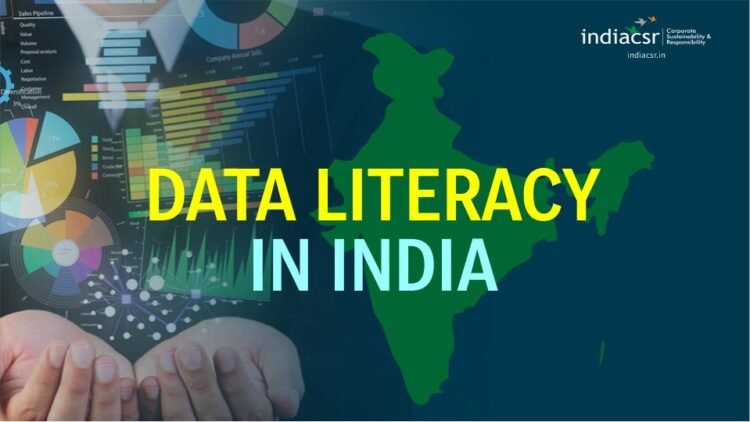To seize growth opportunities driven by new technologies, data literacy will be a key differentiator.
India’s digitalization journey has made a significant impact in solving the population-scale problem. India is on the right path to becoming a $1 trillion digital economy by 2025, according to India Union Minister of State for Entrepreneurship, Skill Development, Electronics & Technology – Rajeev Chandrasekhar. The country has progressed in areas like e-governance, digital infrastructure, literacy, fintech, and e-commerce. There is tremendous promise in an area like 5G technology, AI and ML, cloud computing, and cyber security. The fourth industrial revolution is well underway, and this decade belongs to India to navigate this shift. To seize growth opportunities driven by new technologies, data literacy will be a key differentiator. Whoever can unlock the reams of data and strategically use it to build a data culture in their organization, will win. The 2011 census results reveal that literacy in the country has increased, with the literacy rate standing at 74.04 percent.
Big data impact
Big data is having a profound impact on every part of our lives in the quickly changing world of today. Businesses must adopt technology and data-driven strategies if they want to stay flexible and nimble in an era where disruption is the new normal. Organizations must use customer, market, and brand data to guide their decision-making processes to achieve sustainable growth. Their investments in technology and data must be wise, targeted, and in line with their strategic goals.
In the age of information, the ability to understand, analyze, and utilize data has emerged as a crucial skill. Data literacy, the ability to read, work with, analyze, and communicate with data, plays an essential role in the economic and social development of a society. As we continue to generate vast amounts of data every day, data literacy becomes increasingly important for decision-making, innovation, and overall progress.
Let us explore the concept of data literacy, its impact on economic and social development, and the importance of fostering a data-literate society.
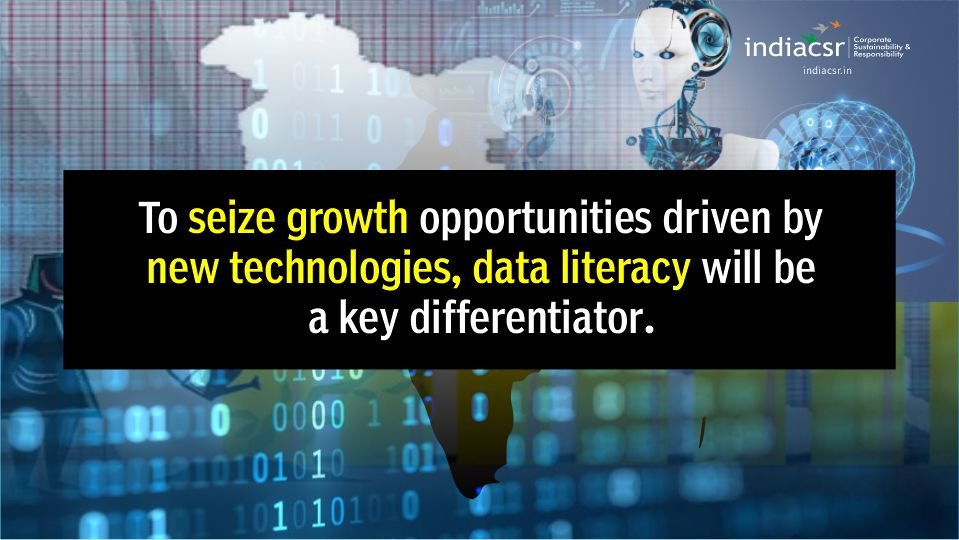
Understanding Data Literacy
Data literacy encompasses the skills required to access, interpret, analyze, and communicate data. It involves critical thinking, problem-solving, and the ability to derive meaningful insights from raw data. Data literacy is not exclusive to data scientists and analysts; it is a valuable skill for individuals across all professions and industries, enabling them to make data-driven decisions and contribute to their organization’s growth and success.
Also Read: Big Data Analytics – Why Is It Important Today?
Importance of Data Literacy to Economic and Social Development
India has a lot of potential to leverage technology for its economic and social development. According to a report by McKinsey Global Institute, India could transform its economy by employing 12 technologies that could have a combined economic impact of $550 billion to $1 trillion a year in 2025. Some of these technologies are the mobile Internet, the cloud, the automation of knowledge work, digital payments, verifiable digital identity, the Internet of Things, intelligent transportation and distribution systems, advanced geographic information systems, next-generation genomics, unconventional oil and gas, renewable energy, and advanced energy storage.
- Informed decision-making: Data literacy enables individuals and organizations to make better, evidence-based decisions. As data becomes more accessible, data-literate individuals can analyze it to identify trends, patterns, and relationships that inform decision-making processes. This ability results in more efficient resource allocation and strategic planning, driving economic growth and fostering sustainable development.
- Innovation and competitiveness: Data literacy fosters a culture of innovation, as individuals and organizations can harness the power of data to identify gaps, challenges, and opportunities. By utilizing data to develop new products, services, and processes, organizations can gain a competitive edge in the market, ultimately contributing to economic growth.
- Social development and policymaking: Data literacy has a significant impact on social development, as it enables individuals and policymakers to identify patterns and trends in social issues. By analyzing data, they can develop targeted policies and interventions to address pressing challenges such as poverty, healthcare, education, and unemployment. Data-driven policy-making results in more effective social programs, leading to improved quality of life and societal progress.
- Empowerment and participation: A data-literate society empowers its citizens by providing them with the tools to actively engage in the decision-making process. Data literacy allows individuals to better understand the world around them and participate in public discourse, ultimately leading to more inclusive, democratic societies.
- Job creation and economic opportunities: As the demand for data-literate professionals grows, new job opportunities arise across various sectors. Companies and organizations require skilled individuals who can understand and interpret data to drive growth and innovation. This demand contributes to job creation, economic opportunities, and overall economic development.
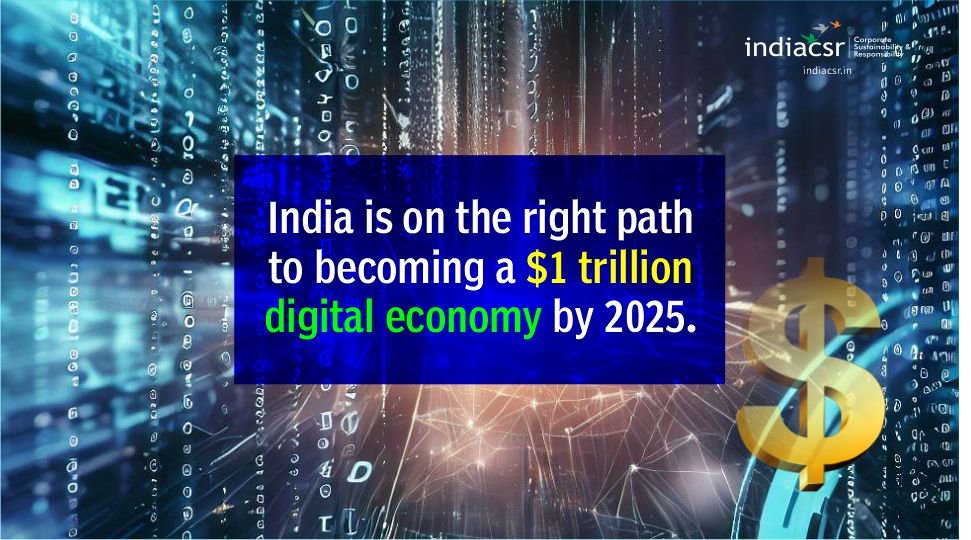
These technologies could help improve productivity, efficiency, quality, and access in various sectors such as financial services, education and skills, healthcare, agriculture and food, energy, and infrastructure. For example, digital payments could help 300 million Indians join the country’s financial system, next-generation genomics could improve crop yields and disease resistance, and advanced energy storage could enable greater use of renewable energy sources. India’s Industry 4.0 valued at USD 4 trillion in 2020, helps to lead technological transformation with innovation in areas like blockchain, quantum computing, drone deployment and big data. These has played key roles in delivering advanced services to consumers.
Also Read: What Data Laws Apply to India? – India CSR
Fostering a Data-Literate Society
Investment in education and training programmes that advance data literacy abilities is crucial if we are to fully realize the potential of data literacy for economic and social development. This investment entails including data literacy in school curricula, offering chances for workforce training, and educating the general public about the value of data literacy.
Important actions to promote a data-literate society include:
- Integrating data literacy into education: By incorporating data literacy education into primary, secondary, and tertiary levels, students can develop the foundational skills required to interpret and analyze data. This early exposure will enable them to adapt to the data-driven world and succeed in various professional settings.
- Upskilling the workforce: Ongoing training and development programs for the existing workforce can help bridge the data literacy gap. Employers should prioritize offering data literacy training to their employees, enabling them to make data-driven decisions and contribute to the organization’s growth.
- Promoting public awareness: Raising awareness about the importance of data literacy can encourage individuals to seek out learning opportunities and engage in public discourse. Governments, educational institutions, and organizations should collaborate to develop campaigns that highlight the value of data literacy in today’s world.
- Collaborating with stakeholders: To successfully promote data literacy, collaboration among governments, educational institutions, businesses, and non-profit organizations is essential. By working together, these stakeholders can identify gaps in data literacy education and design targeted interventions to bridge those gaps.
- Ensuring data accessibility: For individuals to develop data literacy skills, they need access to quality data. Governments and organizations should prioritize making data more accessible and transparent, ensuring that individuals have the necessary resources to become data-literate.
Also Read: SBI Fined by RBI for Data Accuracy Violations
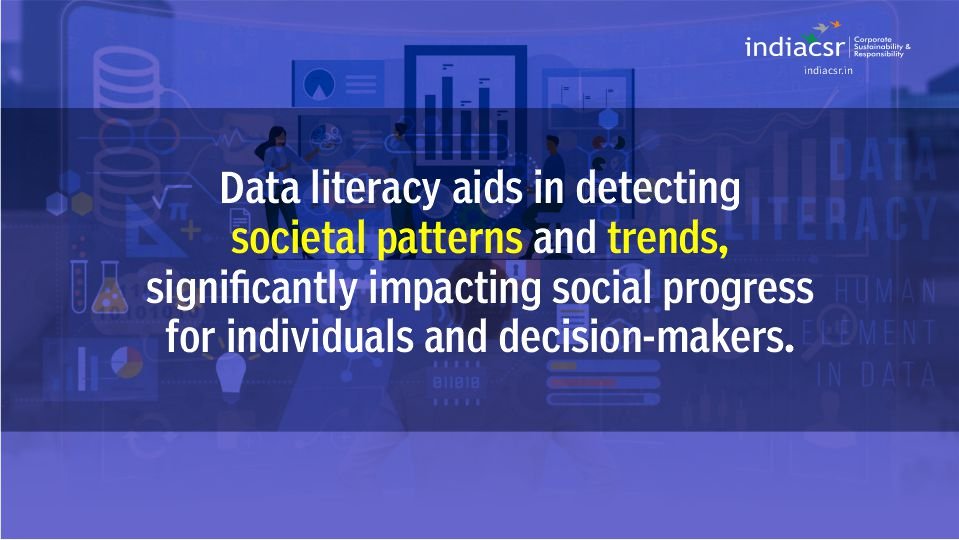
– India CSR
Data Literacy: Closing the Gap for Organizational Success
The impact of data literacy on organizations is profound, as evidenced by a Forrester Consulting survey of over 2,000 decision-makers and employees across 10 countries. Organizations that invest in data literacy and upskilling at scale enjoy significant benefits, including enhanced decision-making, innovation, productivity, and improved customer and employee experiences. Basic data literacy is deemed essential for workforce success across various departments. However, a notable gap exists between the demand for data skills training and its implementation, affecting organizational competitiveness. While 82% of leaders expect all employees to possess basic data literacy, only 40% of employees report being provided with the necessary data skills, despite 70% being expected to heavily use data by 2025.
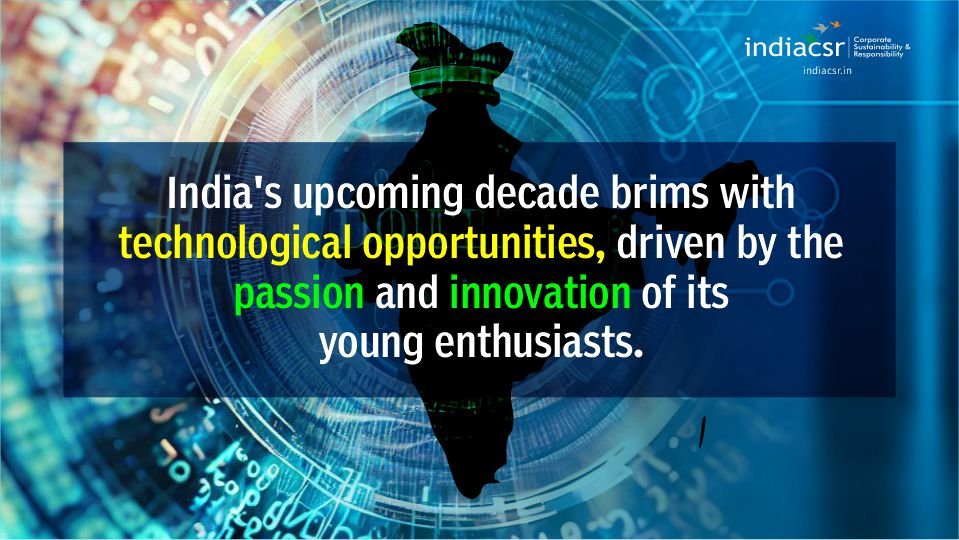
Also Read: Big Data Analytics – Why Is It Important Today?
Key Lessons
- The capacity to investigate, comprehend, and communicate with data is known as data literacy.
- Data literacy encompasses the ability to use, interpret, and make decisions using data as well as the ability to communicate the importance and value of that data to others.
- Investing in data literacy and upskilling yields benefits such as better decisions, innovation, productivity, and enhanced customer and employee experiences.
Conclusion
In the digital age, data literacy is a crucial skill that drives economic and social progress by allowing people to make informed decisions, encouraging innovation, and facilitating more efficient policymaking.
(India CSR)

